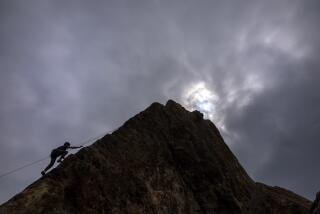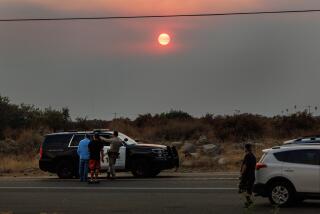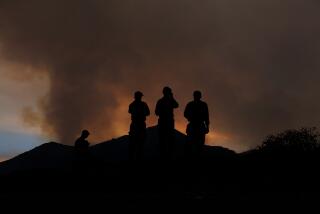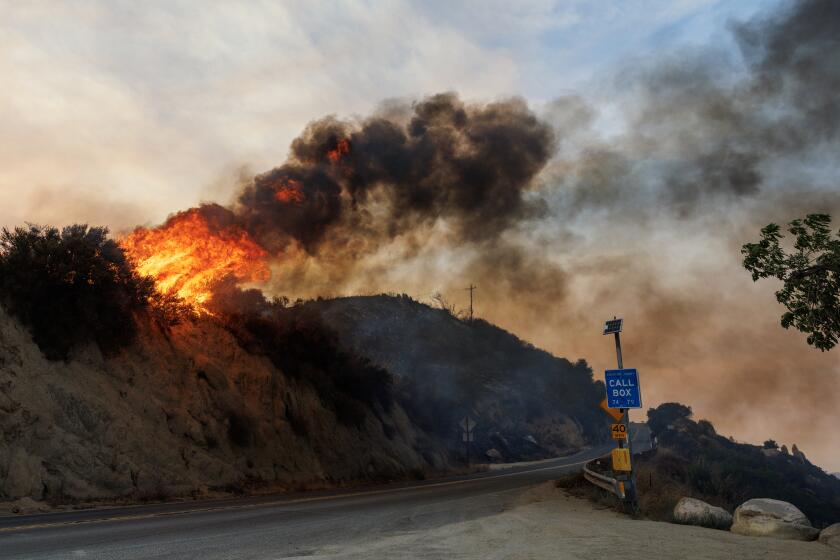‘Crazy, unbreathable’ air forces Southern Californians indoors, clogging daily routines
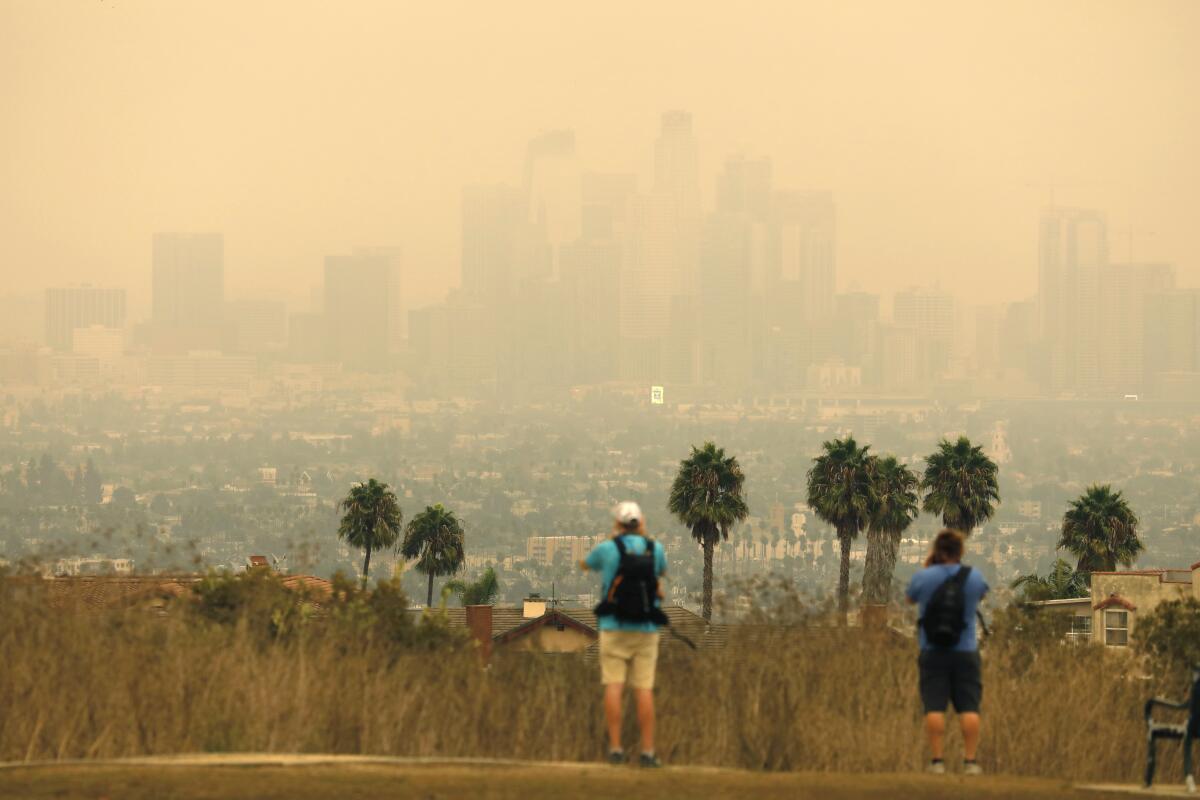
Normally, Lyn Salgado meets up with friends each week to walk along San Gabriel Valley trails, as the women and their eager rescue mutts seek to commune with a benevolent Mother Nature, escaping home quarantine for what she calls “a spot of sanity.”
But not Thursday — nor for the foreseeable future.
“Are you kidding? Everyone is already hypersensitive about their health in this pandemic. With flu, the virus and now the crazy, unbreathable air, we’re just asking for more trouble if we don’t keep away,” said the office manager from Alhambra, who’s in her 40s. As a recent outbreak of fires terrifies communities and poisons skies across California, Salgado is staying in and turning to Netflix.
“Everyone I know in the state is freaking out now that we have fires burning everywhere.”
The unprecedented wreckage left by seemingly endless eruptions up and down the Golden State is creating horrific air quality, according to residents, forcing them to find options to release stress, count their steps and exercise.
Officials from the South Coast Air Quality Management District have warned that smoke and ash will continue to saturate large swaths of Los Angeles, Orange, Riverside and San Bernardino counties this week, sparked by two major fires locally and smoke flowing from Northern California blazes.
The advisory said that most of the Southern California region will be affected by smoke, with the highest readings of fine-particle pollution, tiny lung-damaging particles known as PM2.5, in areas closest to the Bobcat and El Dorado fires.
Salgado has a cousin living near the San Gabriel Mountains who’s been evacuated due to the Bobcat blaze, so she’s busily checking Twitter alerts to update her relative. . “It creeps me out to see these psychedelic colors of the sun — or sometimes, not even see a sun,” she said.
The Bobcat fire has been producing “substantial amounts of smoke,” according to the agency, generating unhealthy air in Azusa, Glendora and other San Gabriel Valley communities while sending falling ash over much of the L.A. Basin.
Are Pfeifer, 50, woke up Thursday to a gray and yellow haze, knowing he had to abandon his usual 5½-mile running route on the promenade from the corner of San Pedro Street and Pierpont Boulevard in Ventura, ending up at Main Street near the entrance to the 101 North Freeway heading to Santa Barbara. It’s a path he charts every other day, keeping to a fitness regimen as important as his commitment to plant-based food.
For the clinical analyst for surgical services at Los Robles Hospital & Medical Center in Thousand Oaks, this week “is a wash unless we don’t care what we breathe in. What concerns me is if you inhale, you may get particles attached to your lungs, and who knows what develops later on.”
Pfeifer and others worry that the intensity and prevalence of the firestorms — which already have killed 12 people and destroyed more than 3,900 structures — means that overburdened firefighters may not be able to contain some of the blazes until October, forcing more Southern Californians indoors and clogging their daily routines.
“We’ve got to pay more attention to the environment, to our climate,” he said. “Nature is telling us that we can’t go on the way we are. I just think everyone can do their part, however small, you can make a difference even if you use a washcloth and just stop buying paper towels.”
In times when it’s wise to remain indoors, experts offer guidelines for those devoted to exercise.
Michael Kleinman, professor of occupational and environmental medicine at UC Irvine, said people should first check the air quality index before going out and perhaps “limit yourself to gentle walking if the air quality is OK.”
Kleinman, associate director of the school’s Air Pollution Health Effects Laboratory, also suggests stretching or a low-impact routine that includes a few sets of resistance work or squats and “not to the extent where you’re increasing your heart rate or ventilation rate.”
“If you are subject to asthma or if you have difficulty breathing under normal circumstances, when we have these extreme situations, take a break.”
Vince Le, 35, is grateful that he can count on his home gym, completed during quarantine with the addition of an elliptical machine. With both his regular Peters Canyon hikes in Tustin and monthly hike in Runyon Canyon interrupted, he had to invest in getting more equipment.
“For those of us worried about smoking, well, going outdoors and doing strenuous exercise these days is like lighting up a cigarette. Imagine what it’s doing to your lungs,” said the Garden Grove businessman.
Healthcare experts counsel those who must exercise to do it in the morning because ozone levels tend to worsen in the afternoon. Moreover, the public should make preparations for the long term.
“The number of fires, the intensity of the fires, the spread of the fires — they keep escalating every year. The predictions are for more and more fires,” Kleinman said. “With a few small exposures, our bodies can fight it. But our fire season is now lasting months, not weeks like it used to be. People need to educate themselves. Paper marks don’t filter out teeny particles which can come from smoke. What we should use is a N-95 respirator.”
Le, who runs an e-commerce company selling motorcycle parts, said he would wear a gas mark to if he must venture outdoors for rigorous activity.
“I usually sleep with the window open, but now, they’re all shut. How do we stay healthy if we don’t take care of details?”
Times staff writer Tony Barboza contributed to this report.
More to Read
Sign up for Essential California
The most important California stories and recommendations in your inbox every morning.
You may occasionally receive promotional content from the Los Angeles Times.

